Our Services
Services

Routine visits are run through the week from Monday to Friday, we also run a cheaper Zone Visit scheme from Tuesday to Thursday for routine appointments. (See below) Visits are scheduled during the week as we generally prefer not to do routine visits at the weekend due to staff limitations, but they may be available on a Saturday via prior arrangement. For shared visits, the fee is reduced accordingly. Owners preferring to transport their horses, ponies or donkey for treatment can be seen at the equine clinic in Burnhill Green by appointment.
Please call the main hospital on 01902 424725 to make arrangements for your visit.
Emergencies are covered 24/7 by our own vets. For out of hours emergencies call the main Wolverhampton hospital on 01902 424725 then follow the directions on the answer phone message which will put you through to the on duty small animal vet, who will take your details and then pass you on to the on call equine vet.
We cover a wide geographical for our routine and emergency visits including Wolverhampton, Kidderminster, Cannock, Halesowen, Bridgnorth, Shrewsbury and Stafford.
Zone Visit Scheme
A reduced visit fee zone scheme is available Tuesday to Thursday, concentrating visits to a more localised area on each day. Visit fees are either £16 or £25 depending on location. In order to offer this scheme we are unable to book specific time slots or specific vets, however we are happy to give you up to one hours notice. Visits need to be booked no later than 2pm the day before required.
This scheme is for routine procedures only, including vaccinations, routine dentistry, micro- chipping, passports, health checks and stitch removal. Procedures such as lameness investigations, radiography, colt castrates and pre-purchase examinations are not applicable for zone visits.
Please phone the practice on 01902 424725 to ascertain which zone day is applicable to where your horse is stabled. Please note that zone visit fees cannot be shared.
Visits not booked under the zone scheme can still be booked with the usual visit fee if you require a specific vet or time slot.
Equine Clinic
While many routine procedures can be carried out in the horse’s own stable environment, examination and treatment may often be compromised by lack of suitable facilities.
Comprehensive lameness examinations, including work on hard and soft surfaces, nerve blocking, ultrasonography and/or radiography can be carried out at the clinic.
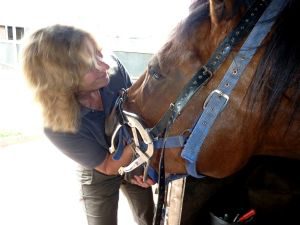
We recommend that all horses have a routine annual dental check up, although some horses will require more or less frequent checks. It is often easy to schedule this with vaccinations on your zone day visit.
We can perform routine rasping and correction of abnormalities where needed.
At a dental check all horses are examined using a special oral gag to allow us to fully examine the mouth safely and effectively. Horses teeth continually erupt throughout their lives. Ideally the rate of eruption should match the rate of attrition (wear). Unfortunately this is rarely the case, which can lead to sharp enamel points developing causing pain and ulceration. We will routinely rasp these as well as checking for any other dental abnormalities such as overgrowths, diastema (abnormal spaces between the molars) or loose teeth. We use hand floats and /or a battery run powerfloat.
We would always recommend that youngsters have a dental check up before being broken in, to ensure their mouths are comfortable prior to training commencing. We will often remove wolf teeth at this stage to avoid any bit interference.
Sedation is used if necessary for routine dental work dependent on the temperament of the horse or the nature of the work to be performed. Wolf tooth extractions are routinely done under sedation.
We are also happy to work with registered equine dental technicians (EDT’s) and sedate horses if needed.
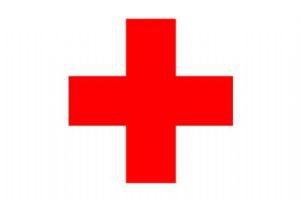
This is provided by our own staff, and we are available 24/7 for emergencies
Out of hours a recorded message will give you contact details for the vet on duty. Listen carefully and please only call in the event of an emergency. Please give your details, full details of the problem, location of the horse and contact telephone numbers to the duty vet. We all have access to your horses records even at night as there is a duty nurse at the hospital who can provide this.
Please note that billing is as normal via the practice, if you are a newly registered client we may require payment at the time of consultation.
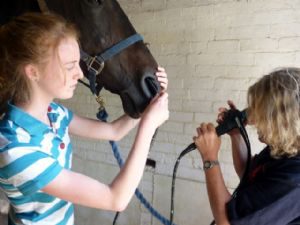
An endoscope is a flexible fibreoptic camera which we use to visualise internal structures and problems in the horse. Most commonly we use it for investigation of abnormal respiratory noises at exercise, investigation of poor performance in race or competition horses or for unresponsive coughing or nasal discharge. It has many other uses, such as in difficulty swallowing, swellings in the nasal or throat area etc.
The light source is powered by batteries with the advantage that it can be used where there
is no power supply, eg. in the field or after a workout, if this is indicated.
Endoscopy can be conducted at home or at the clinic.
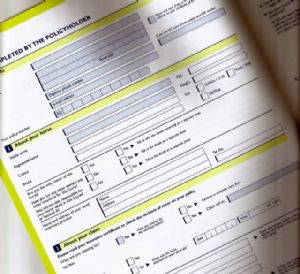
Clients are encouraged to consider insurance for vet fees. All horses should carry some form of public liability insurance. We are always happy to discuss what you do or do not need in an equine insurance policy in order to help you decide what is right for your horse.
Insurance allows your horse to have the best veterinary treatment available, without the worries of financial constraint.
Advances in veterinary medicine – although referral to a specialist centre may be involved – mean that conditions that would once have resulted in euthanasia, for example, some cases of colic and even some fractures, can now be successfully treated. But this can be very costly. Some wounds may take months to heal and cost thousands.
If your horse is insured, please inform your insurance company as soon as possible after an occurrence likely to result in a claim.
Please also inform the attending veterinary surgeon to ensure that we comply with any requirements of the insurance company.
Senior partner Sue Taylor has a special interest in Farriery and works closely with a number of local farriers.
Sue is also an examiner for the Worshipful Company of Farriers.
Corrective or surgical hoof/foot treatment for lameness or deformity/ cracks etc can be carried out in consultation with your own farrier, or through several farriers with whom we work closely.
For some horses that are nervous of farriery, it is sometimes necessary to sedate them in order for even routine work to be carried out, if this is the case we can arrange to visit and sedate the horse with your farrier, or in less severe cases oral sedation can be provided.
We are happy to make arrangements to coincide our visit with the farrier in order to do this.
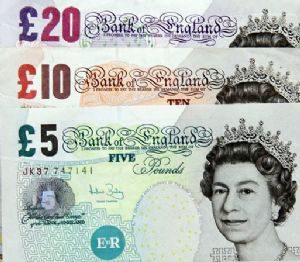
Our fees are kept to the lowest level commensurate with the standards of care and service which the practice provides.
We do not have a “free” visit scheme, however our fees are transparent, we maintain them at a fair level, and we do split the cost of a visit between clients if more than one person is seen on a yard, so it can save a significant amount if several people book at one time. In an on going effort to support our equine clients we also have a reduced visit fee zone scheme available Tuesday to Thursday for routine appointments.
Should you require an estimate of costs we will endeavour to give you one, however, for non routine matters, as cases vary, this may not be accurate.
Fees charged for out of hours visits and on Sundays/Bank Holidays reflect the increased cost of providing this service.
New clients are asked to pay at the time of consultation. Established clients will be forwarded an account at the beginning of the month following treatment.
Prompt payment is always appreciated, and our terms of business request that payment is received by the end of the month in which the invoice is received. We accept cash, cheques and credit card payment, in person or over the phone. Internet payment is now also possible.
Interest may be charged if payment is not received.
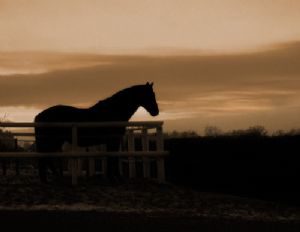
There will come a time that all horse owners dread – having to make THE decision concerning euthanasia and when is the right time.
We all wish for our faithful aging companion to pass away peacefully in his sleep, but this is rarely what happens. We will do all we can to advise and discuss the options available in a professional and sympathetic manner, and the costs involved with those options to help reduce the distress associated with this sad event.
We can make all the necessary arrangements and will discuss the options available with you.
Please let us know if there are insurance implications if euthanasia is being considered for your horse, as you may need to inform or discuss it with them .
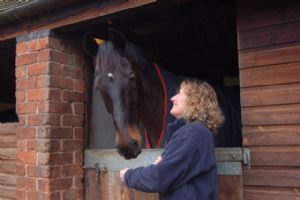
Often owners choose to wait for their horse while examination and treatment is carried out.
In cases where investigation may be prolonged, then the patient may be left on a day patient basis.
Patients in need of ongoing veterinary attention, for example daily dressing changes following trauma (particularly if sedation is required), treatment of sarcoids, or frequent administration of drugs, may be hospitalised at the clinic.
This is cost effective and negates the need for home visits and the disruption this can cause to working owners.
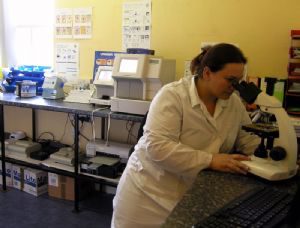
Blood samples taken at the clinic or out on calls are transferred to our laboratory at the main hospital or forwarded to an external specialist laboratory.
The majority of test results are available within one to five days. Urgent tests, which can be run in our laboratory, can be available very quickly, within an hour in some cases if necessary. Some tests may take several days for results to come through, so you must contact us as soon as possible if you have to meet a deadline for perhaps stud or export purposes.
Ideally, blood samples are taken early in the week if the samples are to be forwarded to an outside laboratory. This is to decrease the risk of samples deteriorating due to weekend postal delays.
Blood testing is used when it is not immediately apparent what the problem is with a horse, or for further investigation and monitoring of problems.
It can also be used for determination of pregnancy in some cases.
Faecal samples can be submitted for worm egg counts to aid in a worm control programme.
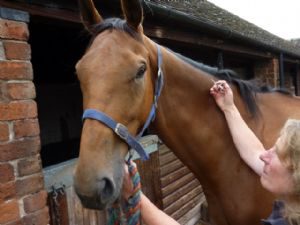
Microchipping is used to permanently identify horses invisibly.
All horses that do not now have a passport must be microchipped in order for a passport to be issued.
All horses are required by law to have a passport if over 6 months of age. All foals born should hence now be microchipped and then passported.
It is also extra security in case of theft, and also permanently identifies a horse with few distinctive markings.
It is a permanent form of identification, an electronic animal identification system, and is implanted in the left side of the crest of the neck.
Each chip has its own unique code which provides information such as the owner’s name, address, and telephone number, which is stored on a computer database that is contacted when an animal’s identity/ownership is in question
We frequently have special offers on microchipping available at a reduced rate- please call for details. We may be able to offer a bulk discount if a number of animals are to be chipped at one location.
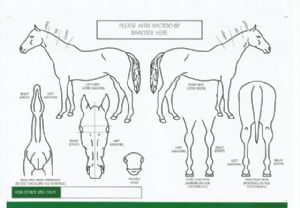
All horses must have a passport if they are over 6 months old.
The identification is in the form of a diagram showing the markings, which needs to be completed by a vet or a registered identifier.If the horse does not have a passport, then it must be microchipped in order to be issued one. This passport should be available whenever the vet visits in case any details need to be entered in it. There is a declaration at section IX in the passport which refers to possible human consumption of the horse, this should be signed. If the horse is designated as not for human consumption it is much easier to use certain drugs as they may otherwise need to be recorded.
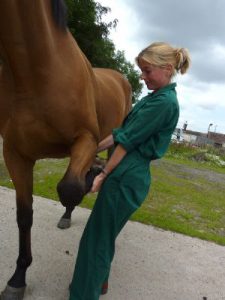
5- stage or 2-stage examinations.
We normally perform 5 stage pre-purchase examinations on horses and ponies
.This involves a general examination of the horse, and examination of hear and eyes, and in hand trot up, then ridden or lunge work, followed by a period of rest and a second trot up. Flexion tests and trotting on a circle on a firm surface are also done.
We recommend routine blood sampling at the examination, which is then stored and but can be tested for drugs should there be a problem after purchase.
In some cases due to perhaps the age of the horse i.e. young and unbroken and hence cannot be worked, or if the value is very low, a 2 stage examination may be performed which is less extensive.This only involves the general examination and heart/ eyes and an in hand trot up. This may miss some detail which would be picked up on a full examination, which we would always recommend if possible.
In some cases there may be a need to perform X-rays to check that there is no underlying bone problem present, or for insurance purposes in a horse of higher value- generally over £10,000. This is easily done using our portable digital x ray unit.
We are happy to do whatever is required, Please call the hospital to discuss your needs.It is also necessary to ensure that suitable facilities are available in order to be able to perform the examination fully. Details are needed of vendor, purchaser, intended use of horse and location of horse.
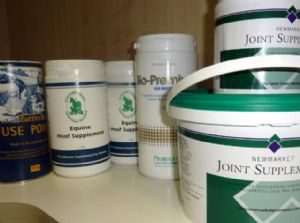
Staff are always happy to discuss the care and management of your horse or pony to reduce the likelihood of disease and other problems, the adage ‘prevention is better than cure’ is very true.
This can include advice about vaccination, worming, diet and general management. Our equine staff are experienced with horses and in a strong position to advise you.
Should a group of people at a livery yard feel that they might benefit from a member of our staff giving a talk regarding preventative healthcare/first aid, please discuss this with us as we would be happy to try and help.
Wormers are always stocked and we are happy to quote for bulk orders at a discount. We also provide a worm egg counting service, multiple samples submitted at one time are cheaper.
We can normally source any feed supplements or additives required and can advise on their value and use in your case.
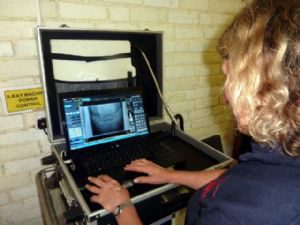
We have a new state of the art digital X-ray processing unit which is portable and capable of taking superb quality X-rays of most areas of the body.
It produces images on site within 7 seconds, enabling us to take whatever views may be needed immediately without the need to return to the practice to process the images.Should there be any need to refer images to a specialist for further opinion, this can be done easily and very rapidly by email.
Taking multiple X-rays for vettings or insurance examinations is now much simpler and quicker. This can be arranged if you require it at the time of the examination, as long as there is somewhere suitable to work and a good mains power supply.
It is still easier for us, and hence a little less cost to you, i.e. no visit fees, for X-rays to be taken at the yard. We also have a larger and more powerful X-ray machine there which, although still portable, is less easy to transport than the small machine. We prefer to use this for upper limb/ back/head X-rays, or if a large number are to be taken in order to limit exposure of people to X-rays.
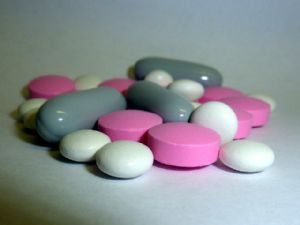
Repeat prescriptions are available for horses on long-term medication.
Whenever possible, please give 48 hours notice. This enables us to check with your vet and ensures that the drugs will be in stock. In order to comply with legislation, it is necessary to check your horse on a regular basis, usually every six months.
Castration and minor surgical procedures requiring sedation and local or general anaesthetic may be done at the owner’s premises.
The horse will require a stable prior to this and possibly afterwards, depending on the surgery undertaken.
Major surgical procedures are referred to a variety of referral practices/universities
Ultrasonography can be carried out either at the clinic or at the client’s premises. Our new ultrasound machine is also able to run off a battery pack making it very useful for those horses unfit to travel at premises with no mains power.
We have a portable ultrasound machine which can be used to assess the musculoskeletal system in limbs as part of a lameness investigation, as well as the back and pelvis. It is used principally to assess soft tissues ie muscles, tendons and ligaments, but it can also be very useful in assessing the smoothness of a bone surface. It is very valuable at times in the investigation of soft tissue swellings elsewhere on the body and to evaluate the extent and nature of wounds. It helped us find a piece of hoof embedded in a horses leg after she had been kicked!!
Ultrasonography is also used in examination of the mare’s reproductive tract for early pregnancy, ovulation, infection, etc.
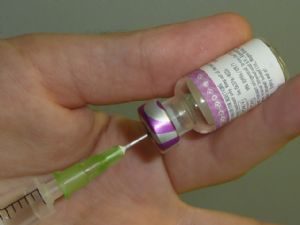
Routine vaccination against equine flu and tetanus is recommended, and must be given for many competitive events.
The required intervals for competition are:
1st-2nd vac 21-92 days
2nd-3rd 150-215 days thereafter within 365 days.
Tetanus vaccine alone is the minimum we would recommend for a horse who is not at risk from infectious disease due to its circumstances, this is achieved by giving 2 doses about 6 weeks apart then a booster every 2-3 years.
Gastroscopy is used to diagnose Equine Gastric Ulcer Syndrome (EGUS). EGUS can occur in any horse from the most sedate lead rein pony right through to racehorses. Foals are also at particular risk – around 50% of foals develop gastric ulcers in the first few months of life.
A gastroscope is a long, flexible video-endoscope that can be passed carefully down into the horse’s stomach (under sedation) to visualise the stomach and see whether or not ulcers are present. We are also able to capture images of any ulcers, so we can define the grade of those present.
Horses need to be starved for a minimum of 16 hours before the gastroscope, this can be done by putting them in an empty stable for the night (so they are not tempted by any bedding) alternatively they can stay at our Equine Clinic for the night before. Water can be given over night but needs to be taken away at least 2 hours prior to the procedure.
Common signs of gastric ulcers are poor appetite, condition and performance along with weight loss and behavioural changes (such as development of girthing pain). If you wish to discuss any of these symptoms with us, or to book in for a gastroscope please call the Wolverhampton hospital.
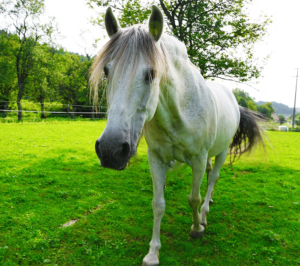
We are lucky that so many horses are living to a ripe old age nowadays; however, looking after a golden-oldie is quite different to caring for a younger animal. And while we’re (hopefully!) through the worst time of the year now, a little bit of extra care and support can make a huge difference to quality – and quantity – of life.
What is old age?
In horses, we call a horse “aged” from the age of 8 years – but that just means we can’t judge their age reliable from their teeth any more! The onset of old age is a bit variable between individuals – and breeds – but in general we’d say that horses are “old” or “geriatric” from about 16-18 years old. Of course, it also depends on how “High mileage” they are, with a horse who’s lived a hard life tending to be “old” a bit earlier.
The reasons for “old age”, as experienced by all mammals, are varied, but the most important single factor is probably the genetic deterioration that occurs as the “telomeres” in the chromosomes decay over time. These telomeres are sometimes referred to as a “genetic clock” because they track the age of a cell; every time it divides – to replace a dead or damaged body cell – they get a bit shorter. Eventually, they are so short that the DNA underneath them is exposed, and the cell dies. Across the whole body, this results in the gradual decline in athleticism, immunity and resilience that characterise old age. Of course, though, this process is accelerated if the horse has had to spend much of its life repairing damage from injury or disease, hence the “high mileage” issue!
Remember too that it can be really variable – there are reports of horses living into their 60s, and it’s not that uncommon to meet a pony in their 40s or 50s!
How does it affect Horses?
Typically, we see a number of changes. Firstly, a decrease in muscle mass – meaning that it is harder for the horse to maintain strength and fitness. We also tend to see declines in immunity – older horses and ponies are often more prone to infections.
Another important change is to the teeth – as the horse ages, their teeth stop growing and then eventually wear out, leaving them with smooth pebble-like teeth – we call this “cupping out”. Eventually, the teeth are lost, and the horse is unable to chew food at all, but even before this they may well struggle to get enough nutrition.
Greying of the muzzle is another common sign, as is a loss of skin elasticity; and sometimes we also see progressive deterioration of the feet or gut.
What are “the diseases of old age”?
As you might expect, these are the diseases that are more common in old age! In particular, we think of…
- Cushing’s Disease (hyperadrenocorticism), caused by a malfunction in part of the brain, is incredibly common in old age – 30% of geriatric horses have the condition, and probably a majority of horses who reach their late 20s are suffering to some degree.
- Dental Disease – as we said above, the teeth tend to deteriorate for some time before being lost.
- Arthritis – caused by wear and tear over a long lifetime, elderly horses are often a bit stiff and sore.
- Cancers – abnormal growths of cells are much more common in older horses, including malignant forms such as lymphoma, melanoma and sarcoma.
How does this change how we care for older horses and ponies?
Well, for one thing they generally need more protection from the elements, as they do not tolerate unpleasant weather as well. This means our threshold for rugging or stabling should be lower – old horses are very prone to rain-scald, for example.
Dental care should be really proactive as well – try and get on top of problems before they get on top of your horse! An elderly horse who starts losing weight is often at the start of a slippery slope of decline, so we need to stay on top of it. Even if your horse has lost all his teeth, though, it isn’t necessarily game over – many horses live very happily for months or years on fibre porridge mixes!
Of course, keeping active and interested is important too – stiff joints need to keep moving, but little and often rather than too much or too little.
What can we do to help?
It is very important to get on top of issues before they become problems – whether that’s dental problems (e.g. quidding), weight loss, stiffness and discomfort, or signs of more serious illnesses like Cushings. So, make an appointment to get your golden oldie checked out regularly by one of our vets, and nip any problems in the bud!
If you want your aged horse to receive a health-check, give us a ring and speak to one of our experienced equine vets – let’s work together to give them the retirement they deserve!
